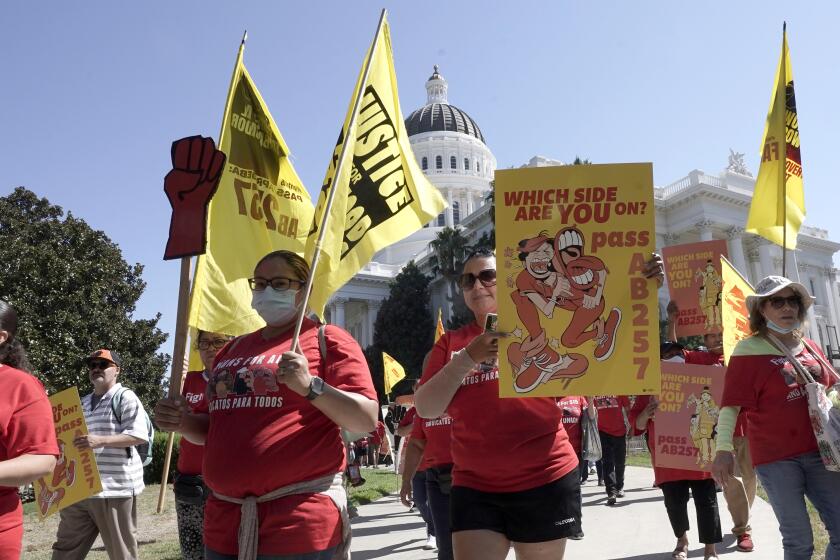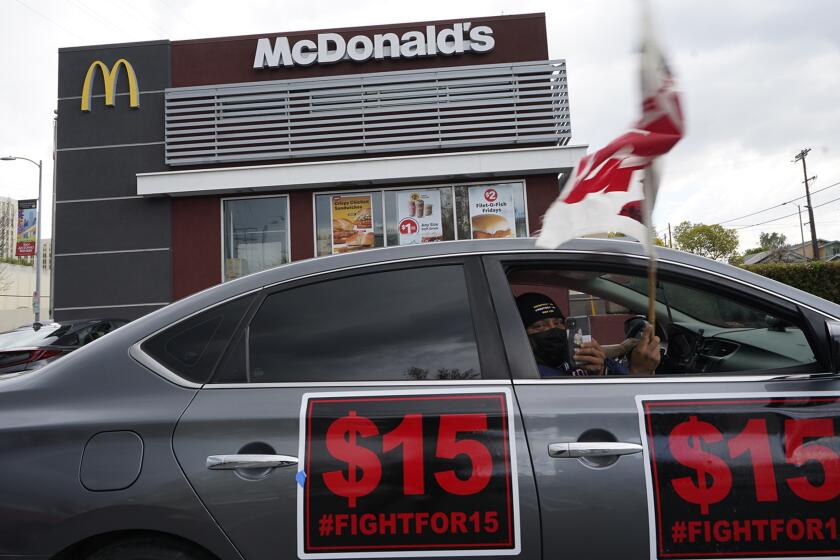Higher wages are coming for California’s fast-food workers. Here’s what to know about the new law

- Share via
Gov. Gavin Newsom on Thursday signed into law a sweeping deal his office helped forge between fast-food companies and unions that will give workers in the industry a pay increase next year.
The legislation represent a rare peace agreement, hammered out in negotiations over the summer, that allows businesses and unions to avoid a costly statewide ballot measure fight over wages.
“I can assure you this wasn’t easy,” said Newsom, who signed Assembly Bill 1228 surrounded by ecstatic union workers in Los Angeles. “That was a tectonic plate that had to be moved.”
Beyond the complex politics involved, the deal provides a series of benefits to workers, and some key concessions to employers, that will kick in next year.
Here’s what you need to know about the agreement:
What will the new law do for workers?
The law Newsom signed Thursday has several perks for workers, including:
- A pay increase to $20 per hour on April 1, which applies to California workers employed by any fast-food chain that has more than 60 locations across the country. California’s minimum wage is currently $15.50 for all workers. Statewide, the increase is estimated to affect more than 500,000 workers.
- The possibility of annual wage increases, beginning Jan. 1, 2025, of either 3.5% or an amount based on average changes to the consumer price index each year, whichever is lower. A council of representatives of workers and employers will work with state agencies to determine whether future increases should be given and whether the bumps would apply to fast-food workers statewide or in specific regions.
- In addition to wages, the council can also work with state agencies to recommend minimum standards for employee hours and other working conditions.
- As part of the larger agreement, the Service Employees International Union California avoids a ballot measure fight that would have cost millions of dollars and can instead redirect union workers to knock on doors and make calls in support of other labor priorities in 2024.
Fast-food companies, under a complex peace accord with labor unions, will pull a referendum off the California ballot that sought to reverse AB 257.
How is this different than the fast-food law that was signed last year?
Labor unions successfully pushed Assembly Bill 257, also known as the Fast Food Accountability and Standards Recovery Act, through the state Legislature last year.
The initial fast-food law, which Newsom signed last September, created a statewide 10-member fast-food council and regional councils composed of labor and employer representatives to set minimum wage, employee hours and working condition standards in California.
Under the law, the council could have increased the minimum wage up to $22 an hour in 2024 for employees of chains with more than 100 restaurants.
Fast-food companies quickly launched a successful campaign to qualify a referendum on the ballot to reverse AB 257, which paused the law from taking effect until a statewide vote in November 2024.
Under the new agreement reached between fast-food companies and labor, the referendum will be removed from the ballot and the new law, AB 1228, will override AB 257 from last year.
What did fast-food companies get out of the deal?
Under the final five-year peace agreement that expires in 2029, fast-food companies won some concessions and staved off several potential burdens that unions created as incentives to convince businesses to come to the table and negotiate. Those include:
- Unions agreed to pause efforts to pass a law to make fast-food franchisers legally liable for labor violations committed by franchisees, which could have increased legal costs and fines for corporations.
- Local governments will not be able to force fast-food companies to increase wages regionally for workers beyond bumps approved by the state.
- Labor had persuaded state lawmakers and the governor to revive the defunct Industrial Welfare Commission under the state budget earlier this year. The commission would have had more authority to raise wages without limits and to enact workplace conditions for fast-food and other California industries. The commission served as an insurance policy for unions if the fast-food industry’s referendum on AB 257 succeeded and the original fast-food council was nullified. Lawmakers agreed to defund the Industrial Welfare Commission as part of the deal.
- Fast-food companies also save millions of dollars by calling off the referendum battle over AB 257.
Almost as soon as California’s fast-food labor law had been signed, critics started trying to overturn it. Here’s what you need to know about AB 257.
Who will sit on the new council?
The new Fast Food Council, which is similar to the original council created under AB 257, will consist of nine voting members:
- Two representatives of the fast-food restaurant industry.
- Two franchisees or restaurant owners.
- Two restaurant employees.
- Two advocates for fast-food restaurant employees.
- One member of the public who is not affiliated with either side and will serve as chair.
The council will also have two non-voting members: one each from the Department of Industrial Relations and the Governor’s Office of Business and Economic Development.
More to Read
Sign up for Essential California
The most important California stories and recommendations in your inbox every morning.
You may occasionally receive promotional content from the Los Angeles Times.
















